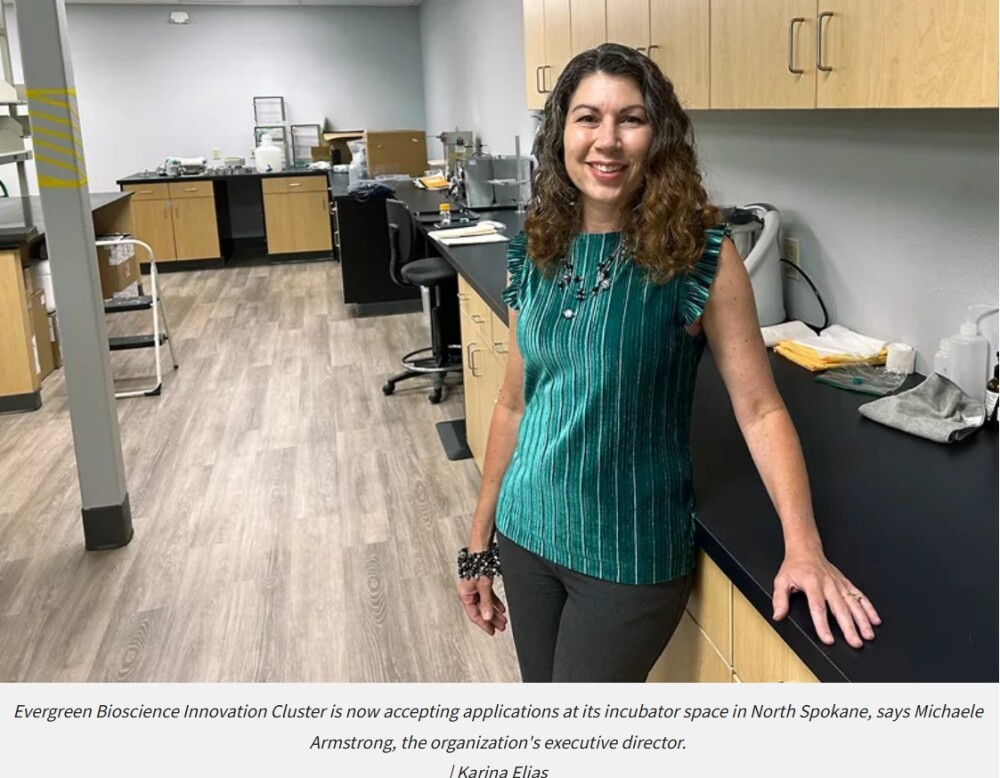Catching up with Michaele Armstrong of Evergreen Bioscience Innovation Cluster
Thursday, August 14, 2025

(as reported in the Journal of Business by Karina Elias)
Two years ago, Evergreen Bioscience Innovation Cluster was sketching out plans for a sprawling 77,000-square-foot life sciences hub on the Spokane River. While the proposed building is still envisioned, the organization has taken a tangible step toward its larger goal: turning the Inland Northwest into a competitive hub for life science innovation.
The innovation cluster, which operates as Evergreen Bio, has launched a 5,000-square-foot bioscience business incubator inside a former NeoGen Corp. facility at 10220 N. Nevada.
The incubator is designed to give early-stage bioscience companies affordable, flexible access to office and wet lab space, as well as room to work, grow, and experiment without the financial burden of taking on a year-long lease term. For Evergreen Bio and its executive director, Michaele Armstrong, the facility is both a resource for startups here and a proof of concept for transforming the region into a life science innovation hub.
Armstrong, who took the helm of the organization in spring 2024 and is the co-founder of Washington State University’s business incubator SP3NW, says the incubator on Nevada Street already has its first tenant moved in and is accepting applications to fill up its remaining lab and office space.
“One of the things we know about startups is they are typically in need of very flexible terms at a low rate so that they have enough runway to get to market,” Armstrong explains. “That’s what this incubator is really geared towards. It’s giving them a space where they can do their R&D and start to scale. … This is not a scaling facility, but it gives them enough runway that they can do their go-to-market activities.”
Before joining Evergreen Bio, Armstrong led SP3NW, which offered a single 532-square-foot wet lab. Even in that small footprint, she notes, one tenant, Integrated Lipid Biofuels, was able to secure funding, expand operations, and eventually split into two companies with a total of six employees.
“If 536 square feet can make one company with one employee into two companies with six employees, 5,000 square feet should do potentially 10 times that,” Armstrong says.
The incubator offers three private offices, a small conference room, hot desks for visiting team members, a wet lab, office space for three to five companies, a shared fume hood, a Type II water system, other essential lab equipment, and a dishwasher. Armstrong says more specialized gear, including an autoclave, biosafety cabinet, and a countertop centrifuge, will be added in the coming months.
The incubator occupies one-third of a 15,000-square-foot facility, and if demand grows, Evergreen Bio has the option to expand into the unused portion of the building.
Instead of locking tenants into multiyear leases, the incubator runs on a membership model starting with a three-month commitment, Armstrong says. Rates range from $130 to $150 a month for office-only use to between $500 and $1,500 a month for lab and office space, depending on size and equipment needs. The goal, Armstrong says, is to remove cost and commitment barriers that often keep startups from getting off the ground.
Additionally, the incubator is still within Spokane County limits, which allows companies to apply for funds from the Health Sciences & Services Authority of Spokane County, which Armstrong describes as a "game changer" for startups.
When the Journal last reported on Evergreen Bio’s vision for a 77,000-square-foot building on the banks of the Spokane River two years ago, the plan was bold: four stories of lab, office, and shared collaboration space designed to attract and anchor bioscience companies from across the Mountain Northwest, which includes the states of Washington, Idaho, Montana, Oregon, and Utah. But like similar projects in other markets, it became clear the concept would need a fully developed pipeline of tenants and partnerships in place before construction could be possible.
Rather than wait for the perfect conditions, Armstrong says the organization chose to build the pipeline now. The new incubator offers a smaller space for early-stage companies to establish themselves in Spokane, with the idea that some will graduate to larger facilities. That could include the University District's planned 400 Block development along East Sprague Avenue, where Evergreen Bio is exploring a partnership to create 18,000 square feet of wet lab space as an intermediate “scale-up” step.
Founded in 2021, Evergreen Bio operates as a nonprofit with Greater Spokane Inc. as its fiscal sponsor. It works closely with Washington State University, which refers high-potential startups and offers research support to the organization. The incubator is funded through a $140,000 award from the Washington State Department of Commerce’s Innovation Cluster Accelerator Program Cohort 3. Evergreen Bio has also partnered with nonprofit My Green Labs, which will certify the lab space, as well as train member companies in sustainable lab practices, a benefit that will help them lower costs long-term, Armstrong says.
The incubator is the latest milestone in a 20-year effort to position Spokane as a hub for life science, says Armstrong. That effort, she says, began with a coalition of business leaders asking “what’s next” for the region’s economy—an initiative that ultimately led to the creation of the University District, the formation of HSSA, and the establishment of medical school programs by both WSU and the University of Washington-Gonzaga University Health Partnership. Vision 2030, the community’s long-range growth plan, calls for expanding health and life science jobs, research, and commercialization.
Armstrong sees the incubator as one piece of that puzzle. Alongside the medical schools, a grant-making agency for life sciences, and other ecosystem supports, she says it creates conditions for startups to stay and scale here, rather than relocating to larger markets.
“It’s really amazing to now be part of that story,” Armstrong says. “We know that the region is ripe for continued growth and accelerating growth in this area. It’s just a matter of how we move beyond some of the current funding challenges.”